How Much Does It Cost to Rewire a Whole House?
Rewiring a whole house typically costs between $11,300 and $26,600, averaging $6 to $12 per square foot. This estimate includes labor, materials, permits, and the replacement of all wiring, outlets, switches, and the electrical panel if needed. Costs can vary based on the size of the house, the complexity of the job, local labor rates, and any additional upgrades like smart home features or energy-efficient systems. Investing in a professional rewiring ensures safety, compliance with current electrical codes, and can enhance your home’s functionality and value. Proper planning and budgeting are essential for a successful rewiring project.
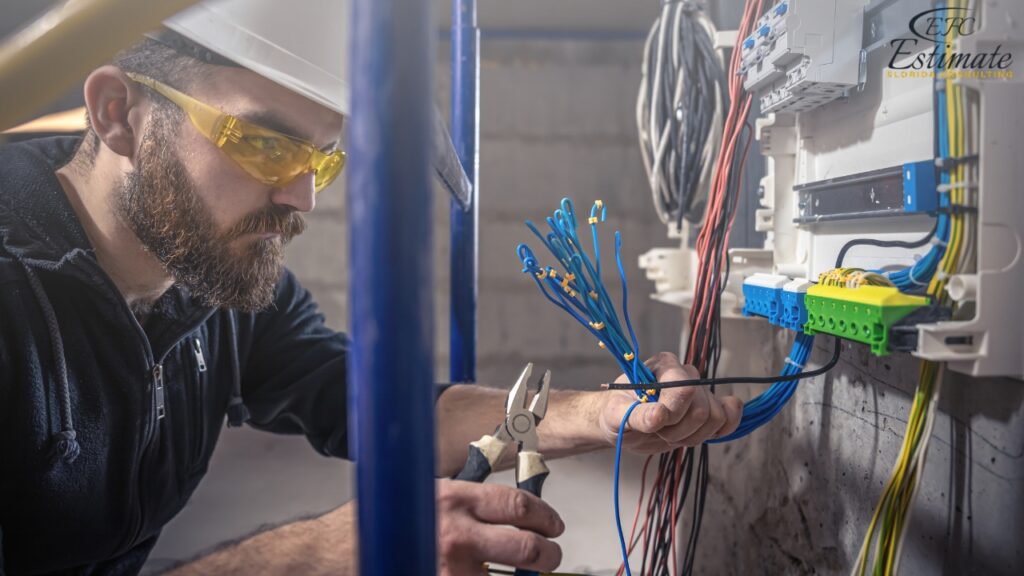
Cost Breakdown for Rewiring a House
Planning and Inspection
Before starting the rewiring project, it is essential to have a thorough inspection and planning phase. This includes assessing the current electrical system, identifying any issues, and creating a detailed plan for the rewiring.
Service | Cost Range |
Electrical Inspection | $200 – $500 |
Planning and Consultation | $50 – $150 per hour |
Thorough planning and inspection help ensure that the rewiring project is carried out efficiently and effectively, addressing all necessary upgrades and complying with local electrical codes. An initial inspection can identify potential hazards, such as outdated wiring or overloaded circuits, which need to be addressed during the rewiring process. Planning and consultation with a professional electrician can also help homeowners understand the scope of the project and anticipate any challenges that may arise. This phase is crucial for setting realistic timelines and budgets, ensuring that the project stays on track from start to finish.
Materials
The cost of materials for rewiring includes new wiring, electrical panels, outlets, switches, and other necessary components. Here’s an estimate of material costs for a whole house:
Material | Cost Range |
Electrical Wiring | $1,500 – $3,000 |
Electrical Panel | $1,000 – $2,500 |
Outlets and Switches | $500 – $1,000 |
Circuit Breakers | $200 – $500 |
Other Electrical Components | $300 – $700 |
Total Material Cost | $3,500 – $7,700 |
Choosing high-quality materials is essential for ensuring the safety and durability of the new electrical system. The type and quality of materials can also impact the overall cost. For example, copper wiring is more expensive than aluminum but offers better conductivity and safety. Similarly, high-quality outlets and switches are more durable and less likely to cause electrical issues. Investing in superior materials can result in a more reliable and long-lasting electrical system, reducing the likelihood of future repairs. Additionally, using modern, energy-efficient components can help lower energy bills and improve the overall efficiency of the home’s electrical system.
Labor
Labor costs for rewiring a house vary based on the size of the house, the complexity of the job, and local labor rates. Here’s an estimate of labor costs:
Labor Task | Cost Range |
Basic Rewiring | $4,000 – $8,000 |
Upgrading Electrical Panel | $1,500 – $3,000 |
Installing Outlets and Switches | $500 – $1,000 |
Hiring licensed electricians ensures that the rewiring project is done safely and in compliance with local electrical codes. Skilled labor is crucial for completing the project efficiently and effectively. Professional electricians can identify potential issues and ensure that all wiring is properly installed and connected. Labor costs also include the time spent troubleshooting and testing the new electrical system to ensure it functions correctly. Experienced electricians can complete the job more quickly and with higher quality, reducing the overall disruption to the household. Investing in skilled labor can prevent future electrical problems, saving money on potential repairs and ensuring the long-term safety and reliability of the home’s electrical system.
Permits and Inspections
Obtaining the necessary permits and inspections is crucial for ensuring that the rewiring project complies with local building codes and regulations. Permit costs can vary based on the location and scope of the project.
Permit and Inspection | Cost Range |
Electrical Permit | $200 – $800 |
Final Inspection | $100 – $300 |
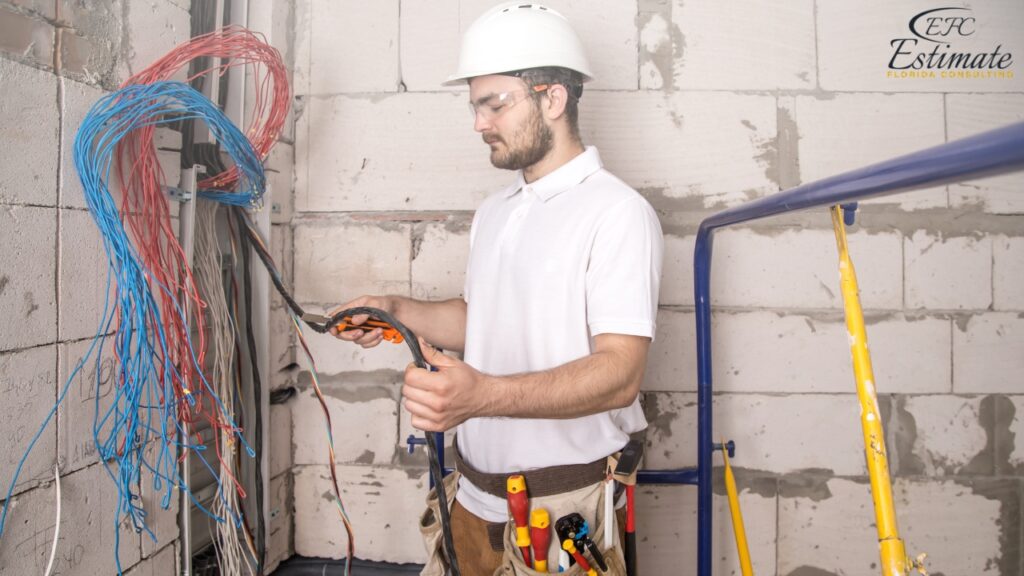
Permits and inspections are essential for ensuring the safety and compliance of the new electrical system. This step helps avoid potential legal issues and ensures the work meets local standards. Inspections by qualified professionals verify that all wiring and electrical components are installed correctly and safely. Obtaining permits ensures that the project is legally authorized and adheres to all necessary regulations, preventing potential fines or legal complications. Regular inspections during and after the project help maintain high standards of workmanship and safety, providing peace of mind for homeowners.
Additional Costs
Additional costs may include repairs or upgrades to other parts of the electrical system, such as installing new lighting fixtures, adding surge protection, or upgrading to smart home technology.
Additional Component | Cost Range |
New Lighting Fixtures | $500 – $2,000 |
Surge Protection | $300 – $800 |
Smart Home Upgrades | $500 – $2,500 |
Adding these additional features can enhance the functionality and safety of the electrical system, providing long-term benefits and added convenience. New lighting fixtures can improve energy efficiency and aesthetics, while surge protection helps prevent damage to appliances and electronics. Smart home upgrades can offer enhanced control and automation, increasing the convenience and modernity of the home. These upgrades can also add value to the property by improving its overall electrical infrastructure and capabilities. Integrating advanced technology can make daily living more convenient and efficient, while also preparing the home for future advancements in smart home systems.
Factors Influencing the Cost of Rewiring a House
Size of the House
The size of the house is one of the most significant factors influencing the cost of rewiring. Larger homes require more materials and labor, resulting in higher overall costs. The number of rooms, floors, and square footage all contribute to the complexity and duration of the rewiring project. For instance, a larger home with multiple stories and numerous electrical outlets will require more extensive rewiring efforts compared to a smaller, single-story home. Additionally, larger homes may have more complex electrical systems, which can further increase the cost and time required for rewiring. Understanding the specific needs of different areas within the house, such as basements, attics, and garages, can also impact the overall project scope and budget.
90% More Chances to Win Projects With Our Estimate!
- Multi-Family Building
- Hotel Building
- Hospital Building
- Warehouse Building
- School & University Building
- High-Rise Building
- Shopping Complex
- Data Center Building
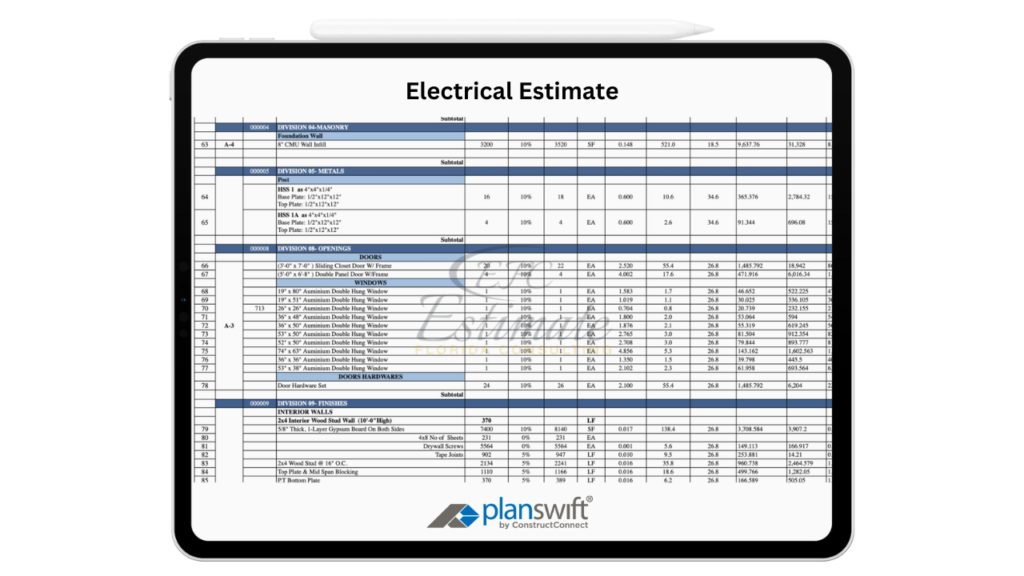
Age and Condition of the Electrical System
The age and condition of the existing electrical system can impact the cost. Older homes with outdated wiring systems may require more extensive work, including removing old wiring, upgrading electrical panels, and installing new circuits. Homes with faulty or damaged wiring may also necessitate additional repairs or replacements, increasing the overall cost. If the existing wiring is not up to current electrical codes, it may require a complete overhaul to meet modern safety standards. Rewiring older homes often involves dealing with outdated materials such as knob-and-tube wiring or aluminum wiring, which can be more labor-intensive to replace. Moreover, older electrical systems might not be compatible with modern appliances and technology, necessitating comprehensive upgrades to support current household demands.
Accessibility and Complexity
The accessibility and complexity of the wiring project can affect labor costs. Homes with difficult-to-reach areas, such as crawl spaces, attics, or tight wall cavities, may require more time and effort to rewire. Additionally, complex electrical systems with numerous circuits and connections can increase the labor required. Rewiring homes with finished basements, intricate ceiling designs, or built-in cabinetry may also present additional challenges that can drive up costs. The need to navigate through these obstacles carefully to avoid damaging existing structures can add to the overall labor time and expense.
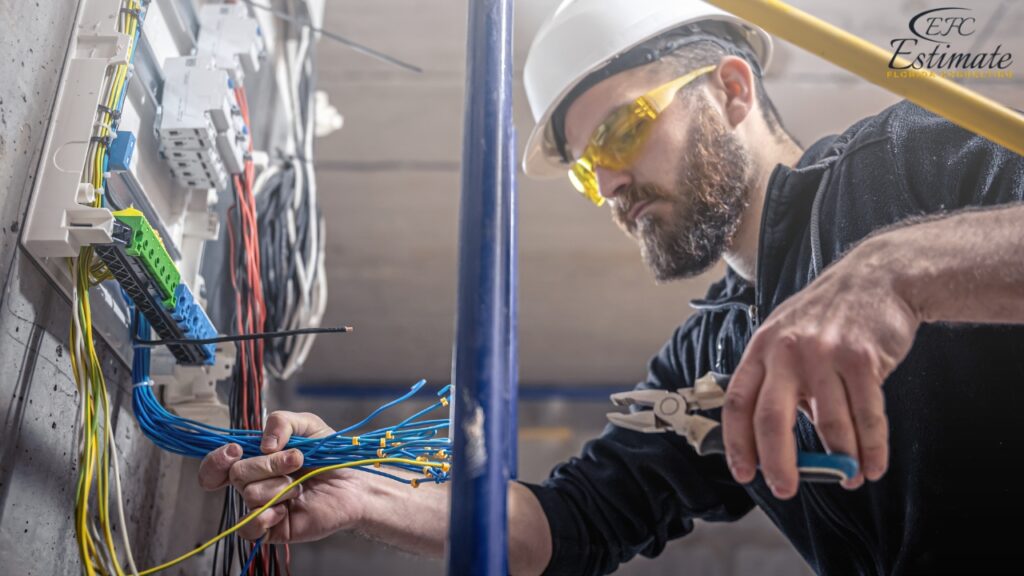
Homes with unique architectural features or historical significance might require specialized techniques to preserve their integrity while updating the electrical system.
Local Labor Rates
Labor rates vary by region and can significantly impact the cost of rewiring. Areas with higher costs of living generally have higher labor rates, which can increase the overall expense of the project. Hiring experienced and licensed electricians is essential for ensuring the job is done safely and to code, but it may also come with a higher price tag. The expertise and skill level of the electricians involved play a crucial role in the quality and safety of the rewiring project. Local demand for electrical services can also influence labor rates, with higher demand potentially leading to increased costs. In addition, areas prone to frequent electrical issues or severe weather conditions may have higher labor rates due to the increased complexity and urgency of electrical work.
Benefits of Rewiring a House
Enhanced Safety
Rewiring an older home can significantly improve safety by replacing outdated or faulty wiring that may pose a fire hazard. Modern wiring meets current safety standards and reduces the risk of electrical fires, shocks, and other hazards. Ensuring that the electrical system is up to date and functioning correctly is crucial for protecting the home and its occupants. By addressing potential safety issues, homeowners can have peace of mind knowing their electrical system is secure and reliable. Additionally, modern wiring materials and techniques can improve the overall durability and resilience of the electrical system, reducing the likelihood of future safety issues.
Increased Home Value
Updating the electrical system can increase the value of your home, making it more attractive to potential buyers. A modern, efficient electrical system is a valuable selling point and can enhance the overall appeal of the property. Homes with up-to-date wiring are often viewed as safer and more desirable, which can lead to higher offers from buyers. Rewiring can also provide an opportunity to upgrade other aspects of the home’s electrical infrastructure, such as installing energy-efficient lighting or adding new outlets, which can further increase the property’s value. A well-maintained and updated electrical system reflects positively on the overall condition of the home, making it a more appealing investment for prospective buyers.
Improved Energy Efficiency
New wiring and electrical components are designed to be more energy-efficient, reducing electricity consumption and lowering utility bills. Upgrading to energy-efficient lighting, outlets, and appliances can further enhance these savings. Modern electrical systems are better equipped to handle the demands of today’s technology, reducing the risk of overloading circuits and improving overall energy efficiency. Additionally, rewiring allows for the installation of advanced electrical components that can optimize energy usage, such as programmable thermostats and smart home systems. Improved energy efficiency not only reduces costs but also contributes to a more sustainable and environmentally friendly home.
Enhanced Functionality
Rewiring allows for the installation of additional outlets, switches, and circuits, improving the functionality and convenience of the electrical system. This upgrade supports modern technology and the increased electrical demands of today’s households. Homeowners can customize the placement of outlets and switches to better suit their needs, enhancing the overall usability of the space. For instance, adding more outlets in high-traffic areas like kitchens and living rooms can make it easier to use and charge multiple devices simultaneously. Enhanced functionality can also support the integration of smart home technologies, making daily tasks more convenient and efficient.
Compliance with Building Codes
Ensuring that your electrical system complies with current building codes and regulations is crucial for safety and legal reasons. Rewiring a house ensures that all electrical work meets local standards and reduces the risk of code violations. Compliance with building codes is essential for protecting the safety of the home’s occupants and preventing potential legal issues. Regular inspections and adherence to local regulations ensure that the electrical system is properly maintained and up to date. Compliance with building codes also ensures that the electrical system is compatible with modern appliances and technology, reducing the risk of electrical issues and improving overall performance.
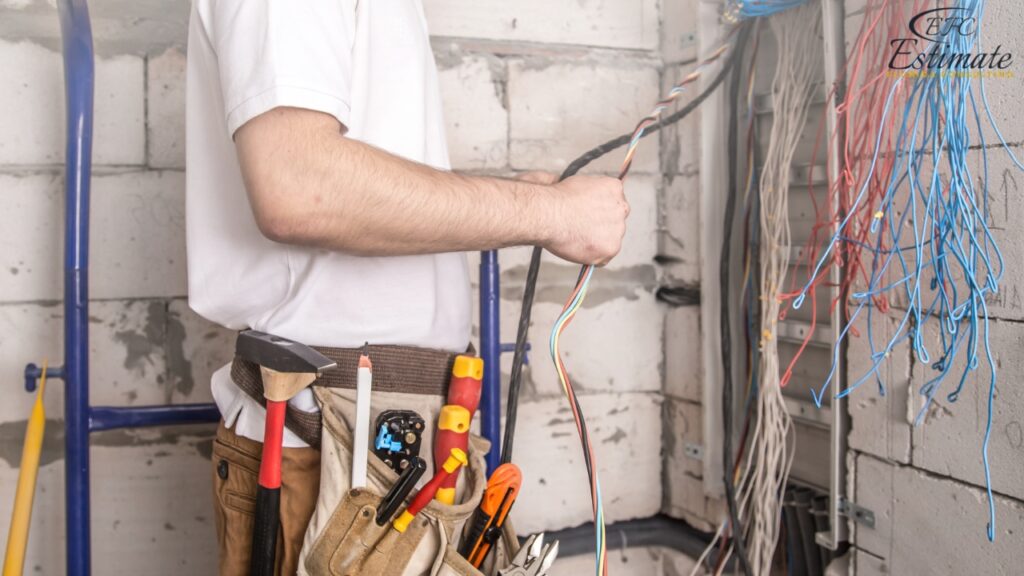
Considerations Before Rewiring
Budget
Determine a budget for your rewiring project to ensure you can cover all costs without overspending. A clear budget helps prioritize essential elements and manage resources effectively. Establishing a realistic budget is crucial for planning and executing the project efficiently. It allows homeowners to allocate funds appropriately and avoid unexpected financial strain. Budgeting also involves considering potential additional costs, such as upgrades or repairs, to ensure the project stays within financial limits.
Hiring a Qualified Electrician
Hiring a licensed and experienced electrician is essential for ensuring the job is done safely and to code. Verify the credentials and reputation of the electrician before starting the project. A qualified electrician can provide expert advice, identify potential issues, and ensure the project complies with all safety regulations. Checking references and reviews can help homeowners select a reliable professional for the job. Hiring a reputable electrician also ensures that the project is completed efficiently and to a high standard, reducing the risk of future electrical problems.
Planning and Preparation
Proper planning and preparation are crucial for a successful rewiring project. This includes assessing the current electrical system, identifying necessary upgrades, and creating a detailed plan. Thorough planning helps homeowners understand the scope of the project and anticipate any challenges that may arise. Preparation also involves ensuring that the home is ready for the rewiring process, such as clearing access to electrical panels and outlets. Effective planning and preparation can streamline the project, minimize disruptions, and ensure a smoother execution.
Minimizing Disruptions
Rewiring a house can be disruptive, requiring access to walls, ceilings, and floors. Plan for temporary disruptions and consider ways to minimize inconvenience during the project. Homeowners should prepare for potential disruptions to daily routines, such as power outages and restricted access to certain areas of the house. Planning for temporary accommodations, if necessary, can help minimize inconvenience. Effective communication with the electrician can also help manage expectations and ensure a smoother process.
Future Electrical Needs
Consider your future electrical needs when planning the rewiring project. This includes planning for additional circuits, outlets, and modern technology to ensure the system can accommodate future demands. Anticipating future needs can help homeowners avoid the need for additional upgrades later on. For example, planning for the installation of electric vehicle chargers or home automation systems can future-proof the electrical system. Considering future needs ensures that the electrical system remains functional and relevant as technology and household requirements evolve.
Download Template For Electrical Project Breakdown
- Materials list updated to the zip code
- Fast delivery
- Data base of general contractors and sub-contractors
- Local estimators

Conclusion
Rewiring a whole house is a significant investment that involves various costs related to planning, materials, labor, permits, and additional features. By understanding these costs and considering factors such as the size of the house, the complexity of the job, and local labor rates, homeowners can effectively budget for their rewiring projects. Investing in professional electrical services ensures a safe, efficient, and compliant electrical system that enhances the value and functionality of the home. Proper planning, budgeting, and hiring qualified professionals are essential for the success of a rewiring project. Ultimately, a well-executed rewiring project can provide long-term benefits, including enhanced safety, improved energy efficiency, and increased home value. By carefully considering all aspects of the project, homeowners can achieve a successful and stress-free electrical upgrade.
FAQs
Rewiring a whole house typically costs between $11,300 and $26,600, averaging $6 to $12 per square foot. This includes labor, materials, permits, and replacing all wiring, outlets, switches, and possibly the electrical panel.
Key factors include the size of the house, the complexity of the job, local labor rates, and any additional upgrades such as smart home features or energy-efficient systems.
- Planning and Inspection: Electrical inspection costs range from $200 to $500, and planning/consultation costs $50 to $150 per hour.
- Materials: Electrical wiring costs $1,500 to $3,000, electrical panel $1,000 to $2,500, outlets and switches $500 to $1,000, circuit breakers $200 to $500, and other components $300 to $700.
- Labor: Basic rewiring costs $4,000 to $8,000, upgrading the electrical panel $1,500 to $3,000, and installing outlets and switches $500 to $1,000.
- Permits and Inspections: Electrical permits cost $200 to $800, and final inspections $100 to $300.
- Additional Costs: New lighting fixtures cost $500 to $2,000, surge protection $300 to $800, and smart home upgrades $500 to $2,500.
Electrical inspections cost between $200 and $500, while planning and consultation fees range from $50 to $150 per hour.
Material costs include electrical wiring ($1,500 to $3,000), electrical panel ($1,000 to $2,500), outlets and switches ($500 to $1,000), circuit breakers ($200 to $500), and other components ($300 to $700), totaling $3,500 to $7,700.
Labor costs for basic rewiring range from $4,000 to $8,000, upgrading the electrical panel $1,500 to $3,000, and installing outlets and switches $500 to $1,000. Hiring licensed electricians ensures the job is done safely and to code.
Permits and inspections ensure that the rewiring project complies with local building codes and regulations, avoiding potential legal issues and ensuring safety. Permit costs range from $200 to $800, and final inspections $100 to $300.
Additional costs include new lighting fixtures ($500 to $2,000), surge protection ($300 to $800), and smart home upgrades ($500 to $2,500), enhancing the functionality and safety of the electrical system.
Larger homes require more materials and labor, resulting in higher overall costs. The number of rooms, floors, and square footage contribute to the complexity and duration of the rewiring project.
Older homes with outdated or faulty wiring systems may require more extensive work, including removing old wiring, upgrading electrical panels, and installing new circuits, increasing the overall cost.
Benefits include enhanced safety, increased home value, improved energy efficiency, enhanced functionality, and compliance with building codes. Rewiring ensures the electrical system meets current standards and supports modern technology.
Considerations include setting a budget, hiring a qualified electrician, thorough planning and preparation, minimizing disruptions, and considering future electrical needs. Proper planning ensures a successful rewiring project.
Google Reviews



Process To Get It Cost to Rewire a Whole House Estimate Report
Here I am going to share some steps to get it cost to rewire a whole house estimate report.
-
You need to send your plan to us.
You can send us your plan on info@estimatorflorida.com
-
You receive a quote for your project.
Before starting your project, we send you a quote for your service. That quote will have detailed information about your project. Here you will get information about the size, difficulty, complexity and bid date when determining pricing.
-
Get Estimate Report
Our team will takeoff and estimate your project. When we deliver you’ll receive a PDF and an Excel file of your estimate. We can also offer construction lead generation services for the jobs you’d like to pursue further.

